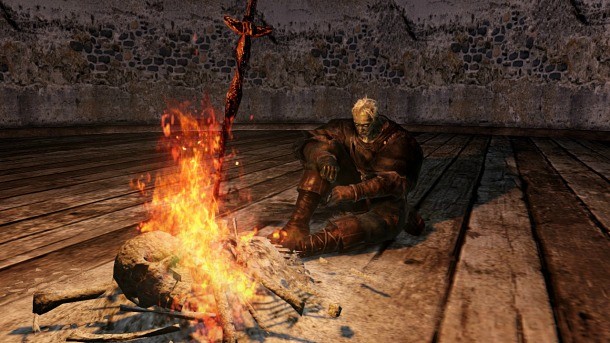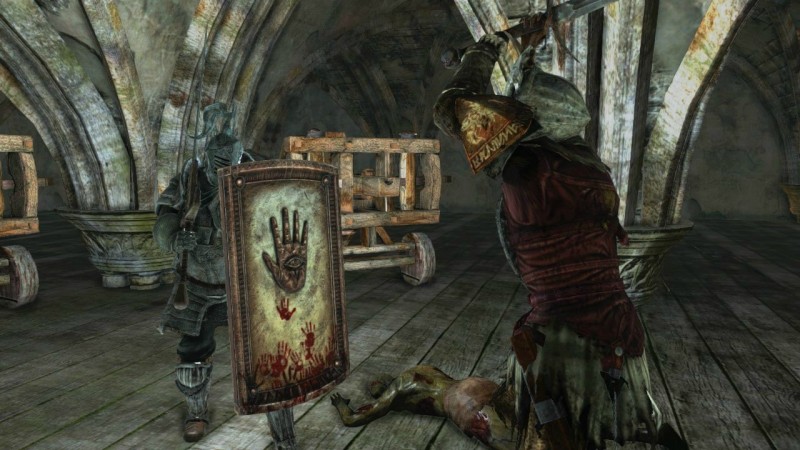Please support Game Informer. Print magazine subscriptions are less than $2 per issue
Dark Souls II Is Not Difficult

Have a discussion about Dark Souls II, and the conversation immediately turns to talk regarding how the game caters to a hardcore audience where elitism runs rampant and “git gud” is the solution to overcoming any challenges a player may be facing.
While the game’s unforgiving death penalties, fragile health bar, and never-ending traps and horrors may make it a bit more difficult than your average game, I’d argue that this perception of difficulty comes from expectations that players have developed based on years of games that are designed very differently than Dark Souls II. The battle with those expectations and assumptions is a leading contributor to the notion that Dark Souls II is “hard”.
The first thing players have to come to terms with is the lack of direction. There are no arrows, trails, or blinking icons indicating where to go. Since Dark Souls II has a variety of areas that can be tackled in any order, players may come to the end of one path and be lost as they are not linearly transported to the next stage, level, or boss. Players may have to go back to other areas and explore to find new possible routes to the next area. It helps to have a good memory or to take notes on where closed off areas are as you play through the game, as those areas may become available after new keys have been collected or bosses have been vanquished. Combine this with the fact that a majority of story and lore is relayed to the player through snatches of dialogue and item descriptions along the way and not explicitly stated, and the game can seem bewildering. What do I do?
The answer to that question is to approach things differently. Unlearn what you have learned. Approach every new area with equal amounts of curiosity and trepidation, uncover hidden secrets, and always look above and below for areas to explore. Is there a way to get there? How? Discovery and exploration play a heavy role in the Dark Souls II experience.
Another huge factor is the combat. Because so many games have taught players to rush into battle with sword drawn, destroying anything foolish enough to get in the way, combat in Dark Souls II can feel alien and intimidating. You’re never going to be able to wade through swarms of foes with impunity, and the essence of combat itself is markedly different than the button mashing execution that other action RPGs serve up.

Combat is a measured task that rewards patience and punishes greed. Instead of rushing into battle guns blazing, one of the most important skills a player needs to embrace to succeed in Dark Souls is observation. What does my opponent do? How can I use my abilities in order to counter those patterns and attacks? By and large, the enemies in Dark Souls II can kill a player with little effort – but only if the player lets them. Going for that extra attack that depletes the stamina bar to zero is a fatal lesson in greed, one that Dark Souls II is more than willing to teach over and over until a player learns.
Instead of charging into combat, players may get better results by moving into new encounters with shield raised, eyes open, no expectation of victory, and the intent to learn an opponent’s weaknesses to exploit them in the future. Most games empower the player to become larger than life; in Dark Souls II you must realize you are not the conquering hero. You’re a visitor in a strange land that doesn’t care about your success or failure.
Yes, bosses in Dark Souls II will often destroy a player in one or two hits. But they do play fair – their patterns and vulnerabilities expose themselves. The challenge presented by some of the more difficult boss encounters in Dark Souls II is heavily tied to a sense of accomplishment when a difficult foe is vanquished; it’s far more satisfying than taking down a boss that you’re “supposed” to defeat in another game.
Dark Souls II doesn’t particularly care if you win or lose, and that’s what makes it so wonderful to take down something like the Ruin Sentinels solo, hands gripping the controller in a tense deathgrip as the antagonist is defeated. It took effort. It wasn’t handed to you. You earned it, and that sense of achievement is far greater than defeating a scripted encounter that you were always meant to defeat.










